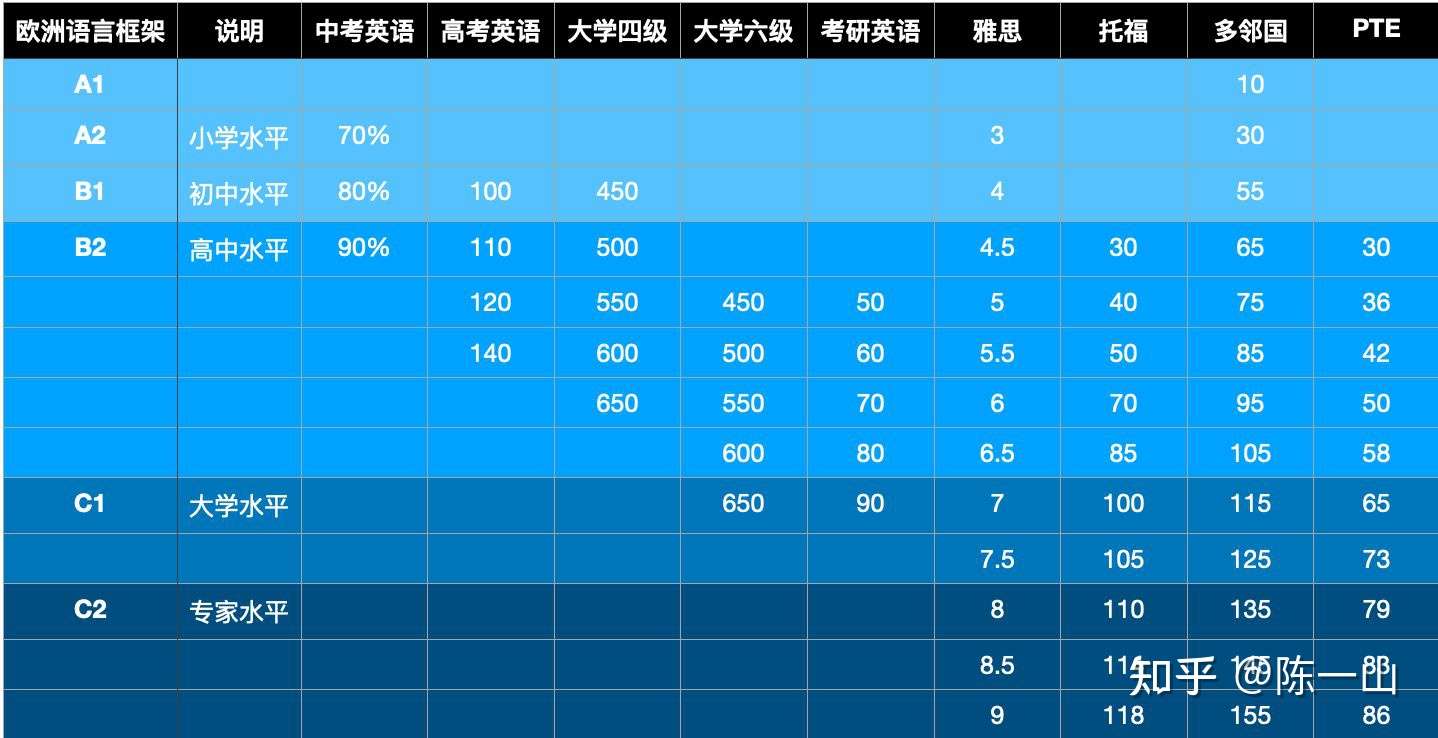Want to know your level before taking IELTS or TOEFL? Congratulations on finding the most comprehensive article on how to convert English proficiency test scores! I will share with you the conversion rules between the common high school entrance exam, college entrance exam, CET-4, CET-6, and postgraduate entrance exam English scores in China and several commonly used international English proficiency test scores.
Without further ado, here are the pictures. This picture is a score comparison chart made based on the official explanation of the exam and Yishan's experience with many students.

It can be clearly seen in the figure that the exams that we often come into contact with rarely involve C1 of the European Language Framework Standard, which is the standard of IELTS 7 or TOEFL 100. This also explains why many students still need to prepare for the exam even though they are good at English.
It feels unfair, right? Actually, the reason is that in China, we don’t need to learn everything in English. In many cases, we only need to read the papers to cope with it. However, if you study abroad, you need to listen, speak, read and write English all the time, so the requirements are relatively higher.

If you use the English reference for the high school entrance exam...
Generally speaking, the scores of middle school students are in the range of 70%-80%, 105-120 for the 150-point area, and 84-96 for the 120-point area. So the IELTS score is about 4 points. Even for very good 90%+ students, their English level is actually limited at this stage, and there is still a gap of about 2 points from the IELTS score of 6 or 6.5 often required for undergraduate studies.
Generally speaking, it will take about 6 months of preparation to make up for a 2-point gap, provided that there is enough offline time.
Why do we have to start studying for international tests like IELTS and TOEFL so early as after the junior high school entrance exam or the first year of high school?
This is a comprehensive consideration. Because when applying to schools, it is not just about IELTS scores, but also about important subject average scores or large subject exams, such as SAT and A-level. These will take up a lot of time in the second and third year of high school. So, if you can master the simplest English in the first year of high school, then you can spend more time on these more difficult knowledge learning and exams.
Therefore, if you are considering applying for an undergraduate program abroad, it is best to pass the IELTS and TOEFL in your first year of high school.

If you use the College Entrance Examination English Reference...
This means that you are already in college. Some "3+1" or "2+2" programs require you to prepare for IELTS scores in your senior year to prepare for studying abroad. Since IELTS is valid for 2 years,So generally speaking, it is best to take the exam after the freshman or sophomore year..
Most students who scored 100-120 in the college entrance examination are still 1 point away from the IELTS score of 6 required for such overseas programs, so if you have enough time after class, you can achieve the goal by preparing for 2-3 months.
If you use CET-4 or CET-6 as reference...
In this case, many students are considering taking the postgraduate entrance examination, including master's and doctoral programs. Generally speaking, master's and doctoral programs require at least 7 or 7.5+ IELTS scores, so even if you have passed the level 6, there is still a gap of more than 1 point.
However, the gap between 6 and 7 points is a difficult point for many people, and they are mainly stuck on several difficult points, such as the structure questions of reading, multiple-choice questions of listening, writing and speaking. These reminders are actually very important watersheds for high scores. If you want to make a breakthrough, you must know where you went wrong.

Relatively speaking, reading and listening are easier to solve on your own. However, for writing and speaking, many students feel that they have spent a lot of time and practiced a lot of questions, but have not made any progress.The reason is that I didn't find my mistakes. After all, I can't evaluate these two items by myself when I practice without a teacher. So a good teacher is very valuable, especially at this time.
That’s all for now. I hope this score comparison table can help students pre-assess their own level and prepare for IELTS and TOEFL in advance. Students who need help are also welcome to consult Yishan’s courses.